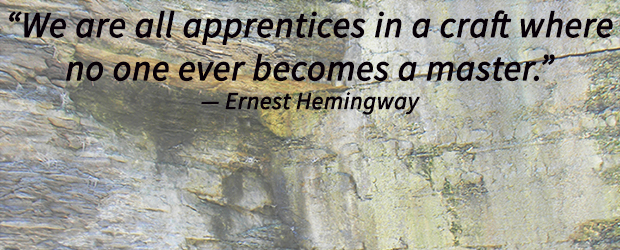
I wasn’t very far into the process when I realized something significant. The discomfort that kept coming up wasn’t about a lack of faith in myself. It was something very different. I had immense respect for the other producers I worked with at Oxygen Sports and they had been at this for years. They were educated in it, experienced at it and really good at their craft.
Who was I then to jump into the mix when I didn’t even know what B-roll was? Why put that fast-paced music under that footage? Why fade in this situation instead of using sharp cuts?
I was humbled beyond belief.
And it is that, right there, that I feel is missing in many ways from our current culture made possible by technological advances most of us couldn’t have dreamt of 20 years ago. I want people to understand that mastery, experience, credentials may not always be necessary but they mean something. It’s one thing to say the Internet gives us a level playing field. It’s another to not grasp that sometimes we have to earn our way to be level with others.
I don’t know what makes a photo special from a composition standpoint, but there are people I respect trained and educated in that. I know the difference between my random good shot on my iPhone and the work of a professional. We know there are stylists who studied at FIT and they have not just an ‘eye’ but a proficient knowledge of how fabric drapes, flatters, breathes. There is a difference between them and the people with a passion for fashion who pull together a cool blog.
The other day I was reading an article on The Daily Beast and was stopped by two typos in the first paragraph. I closed the link and moved on to another site. I cannot fathom the lack of respect for editing that has been brought on by technology. Not a day goes by that I don’t lament the utter lack of clue on how to use an apostrophe (or not). It is sound editing through much of my career that has made me a stronger writer. That learning shouldn’t stop, even for someone as seasoned as me. I am ever grateful to be writing for a living right now, but I really miss being edited.
And this brings me to my dichotomy. As an independent contractor making my living as a writer (28 years and counting) and professional coach (12 years and counting), my response to the Wild West – a.k.a. the World Wide Web — we now inhabit is oh so mixed. When HLN expresses strong interest in publishing my stuff and tells me in the negotiation phase that they don’t pay for opinion content, my inner writer sees stars and expletives begin looping in my head.
But my inner coach sees all the possibilities this presents for my clients. They always wanted to write and begin doing so in their 40s or 50s and technology has opened the world to them. Now I can tell them to pitch HLN or any number of other sites that will get them read but won’t send them a check. They can build a portfolio, get excited about a first byline, find their voice. Same with photographers, musicians, etc.
From there it gets trickier, though. Because once they have the portfolio, then what? By providing free content to get their legs under them, they’ve essentially ruined their own chances of pay gigs down the line because there are less of those now. And there aren’t even editors at many of the places they will get published, so how will they get better?
In a recent article by Matt Richtel in The New York Times called The Youngest Technorati we get a glimpse of how different generations respond to this time of transition we’re in. What a perfect example of the glorious benefits of technology for those who are inventive and growing up with it as their norm. And what a jarring realization for their parents. Richtel writes:
“Things used to be linear. You went to a good school and you got a good job, and that was the societally acceptable thing to do,” said [Stacey] Stern … who was a straight-A student and is a graduate of Duke University. Now, she said, “there is no rule book.”
The story explains that her 17-year-old son, Ryan Orbuch, had invented an app at age 16 and was heading off to Texas for South By Southwest with or without her blessing. There’s so much to celebrate here, even if there is a challenge in giving the unseasoned (and sometimes very young) responsibility and money they may not be ready to handle.
It is my fervent wish that they know they are standing on the shoulders of those who came before them. That they stay open to learning, to becoming better. I’ve always liked the idea of learning the rules so you know when you’re breaking them. That means there’s some humility under the brashness, you know?
Every day I figure out a little more how to make my way in this new media environment. Sometimes I want to bang my head against a wall, but I must also confess that the victories feel a little sweeter because the challenges are so great. The Darwinian aspect scares and exhilarates me.
There’s some surrender happening. And maybe a new philosophy:
What will they think of next? And how do I fit in?
Ultimately it wasn’t about turning away the opportunity to be a television producer because I was feeling humble. It was about trying it and seeing if it fit, all the while knowing there were people around me who could teach me a lot. I appreciated them, but also took my shot.
Grateful. Bold. Going with the flow.
That feels about right.





